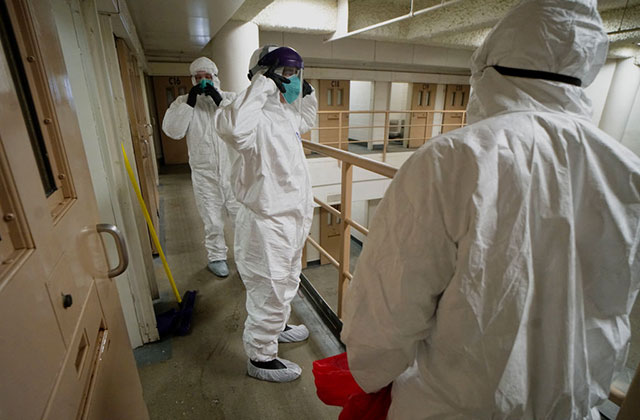Early on in the COVID-19 pandemic (March 2020), when cases started soaring across the country, Colorlines reported that doctors and advocates began to call on prison officials to release incarcerated people who are low-risk to prevent the virus from spreading behind confined walls. Yet over the last two months, July and August, “more than 6,000 prisoners were infected each week for six weeks running,” The Guardian reported today (September 8).
The Marshall Project, which has been tracking novel coronavirus cases in prisons across states since April, reported that more than 115,000 people have tested positive, a seven percent jump in cases from the week before.
“This is almost certainly going to get much worse,” David Fathi, director of the American Civil Liberties Union’s (ACLU) National Prison Project, told The Guardian. The ACLU has sued various states—Arizona, Louisiana, Indiana, to name a few—in an effort to protect incarcerated people during the pandemic.
The families of those in jails and prisons and those who are on lockdown have been ringing alarm bells for months. Back in April, Colorlines reported Chicago’s Cook County Jail had the largest cluster of COVID-19 cases in the country at the time, with 350 cases confirmed. And in May, 286 incarcerated individuals and 90 employees in Georgia Department of Corrections facilities were positive. During the same month in New York, advocates were fighting for the release of 68-year-old political prisoner Jalil Abdul Muntaqim (born Anthony Bottom) from the Sullivan Correctional Facility. Recently, a 15-year-old high school student in Michigan made national headlines when she was detained in Detroit’s Children’s Village juvenile detention center in May for reportedly “not completing her online coursework when her school in Beverly Hills switched to remote learning.”
As for why politicians and many in the public resist keeping people out of prisons during a pandemic, Brendan Solaner, who has researched COVID-19 in prisons, points to fear.
“People don’t make the best decisions when they’re their fearful selves, on any side of the [political] continuum,” Solaner, a professor at Johns Hopkins University Bloomberg School of Public Health, told the Guardian. “We are at risk of making a lot of mistakes.”
